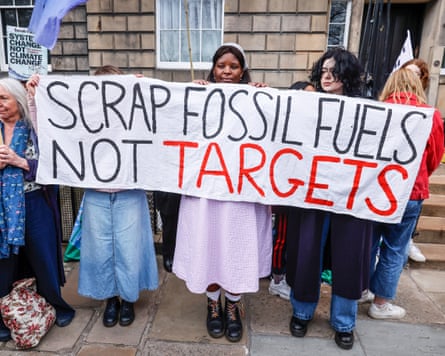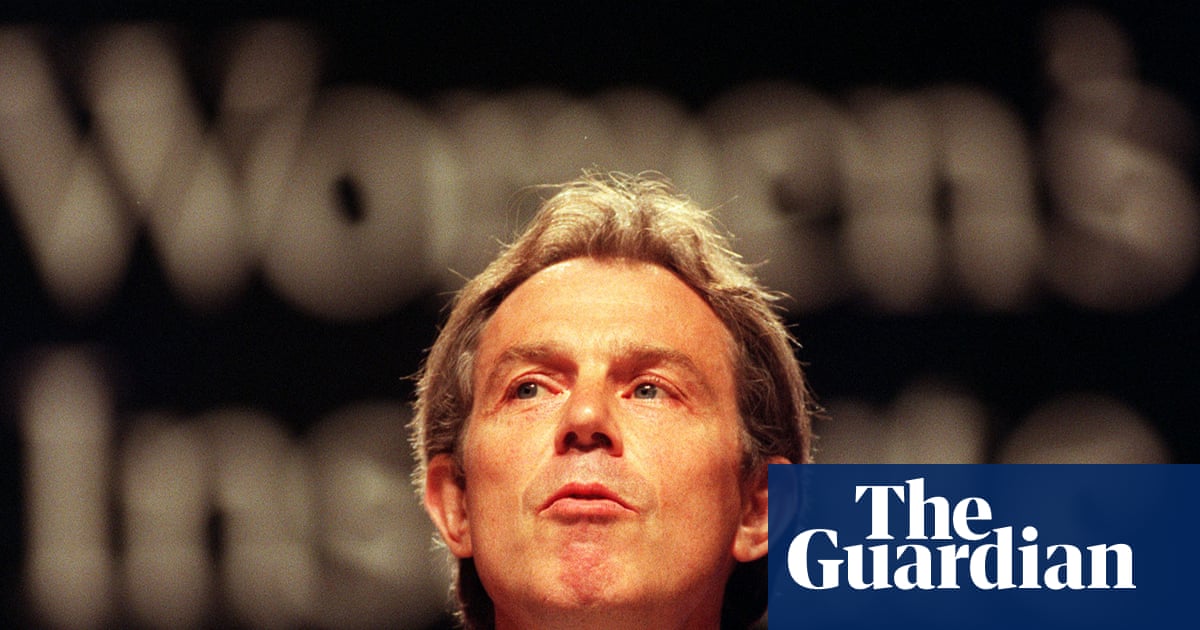This week, the world’s most powerful man claimed that climate change is a “con job”. Speaking at the UN general assembly, Donald Trump told global leaders – including Keir Starmer – that “all of these predictions made by the United Nations and many others, often for bad reasons, were wrong”.
“They were made by stupid people that have cost their countries fortunes and given those same countries no chance for success,” the US president said. “If you don’t get away from this green scam, your country is going to fail.”
Five months ago, Starmer told an audience of world leaders and business executives, gathered in London, that Britain would go “all out” for a low-carbon future because it was “in the DNA of my government”.
But now, the prime minister is facing bruising economic news and disastrous opinion polls. Banks, businesses and governments are taking Trump’s stance as a cue to quietly (or loudly, in some cases) back away from their environmental promises. Reform UK uses net zero as one of its most powerful attack lines, which is lapped up by the rightwing press.
Will Starmer hold firm, or will he buckle? There are tests of his resolve in the months ahead as far-reaching policy decisions loom. The move to allow a second runway at Gatwick this week has prompted fears that the government may water down its policies.
A wider strategy for the North Sea is expected to be confirmed, as well as an update on how £13.2bn earmarked for home insulation will be spent. Wind power contracts are due to be awarded too, with further details on airport expansions. Meanwhile, proposed regulations will set out how to build 1.5m new homes to an acceptable standard.
There is also a legal deadline to be met. As the result of a successful high court challenge by Friends of the Earth, ministers have until 29 October to publish an overarching policy framework setting out how the government proposes to put the UK on track to meet its “carbon budgets”, the stepping stones to achieving net zero by 2050. None of these decisions will be easy, as most require investment from a cash-strapped Treasury, or taking on powerful vested interests such as the fossil fuel lobby and the housebuilding industry.

Energy secretary Ed Miliband told the Guardian that the government remains focused on the net zero target, which would be an engine of economic growth. “The clean energy mission is in the DNA of the government, because it is the opportunity of our lifetime to take control of our energy, to bring down bills, create jobs, and tackle the climate crisis,” he said.
He pointed to recent measures to bolster low-carbon energy. “In just a year we’ve made the biggest investments in renewables and nuclear the country has ever seen, cut hospital and schools’ energy bills through Great British Energy projects, are ensuring new homes will have solar panels as default, and stood up for British interests on the world stage through climate action,” he said.
“These are the decisions our children and grandchildren depend on us to make. We are creating growth, supporting current and future generations with good jobs in our industrial heartlands, and safeguarding our climate to protect our country and our way of life.”
Observers such as Shaun Spiers, executive director of the Green Alliance thinktank, argue that net zero and climate action, far from being a drag, could be an electoral asset as Labour struggles to wrest the political momentum away from Reform.
“Lowering ambition on environmental policies would be a huge own goal for this government, as they offer a decent shot at creating economic growth, making people’s lives tangibly better and ensuring we pass on a planet our children want to live on,” Spiers said. “Whether ministers choose the language of net zero, which know-nothing figures to the right of politics have made a concerted global effort to make toxic, is less important.”
But there are still forces within Starmer’s government who are not convinced. Some believe that net zero, environmental protection and the overriding need to generate economic growth – on which Starmer and chancellor Rachel Reeves have staked their credibility – are, at least sometimes, in conflict.
Labour is backing the expansion of Gatwick, Luton and Heathrow – but the government and industry view that aviation can grow while meeting climate commitments very much depends on the development and adoption of sustainable aviation fuels. Moves to tear up planning regulations have also pitted the Treasury against environmental groups, with Reeves describing concern for “bats and newts” as one of the factors holding Britain back.

On the North Sea, too, Miliband is also under pressure. Labour pledged no new drilling licences for oil and gas, but the Treasury is reported to be pushing for wriggle room, such as the granting of licences already in the system, as a way of stimulating economic growth.
Tessa Khan, executive director of the campaign group Uplift, has described this as “crazy and desperate”.
after newsletter promotion
The North Sea basin is in steep decline, with reserves due to run out within 14 years at current rates, and increasingly expensive as the most accessible fields have already been drained. There were estimated to be more than 400,000 jobs in and supported by the sector in 2014, falling to 120,000 by 2023. However, the Office for National Statistics – using a different definition – found there were only 61,225 direct jobs that year, a 30% fall compared with 2015. The industry accounts for just 0.5% of the UK’s GDP, so relying on expansion to drive broader economic growth is a pipe dream.
Those economic realities do not stop Reform, and Trump, from claiming homegrown fossil fuels are needed – and with energy bills still sky-high and forcing up the cost of living, they have an audience.
The warm homes plan, expected this autumn, should be a rebuttal to this. The fund would fix draughty homes and reduce energy waste, with grants for lower-income households. Zero-interest loans and other assistance could also help those on middle incomes install solar panels and heat pumps.
“This is a historic opportunity to turn every home into a power station and end the energy bill rollercoaster. It is time to power up British homes to deliver energy independence and take back control,” according to Ed Matthew, director of the UK programme at the E3G thinktank.
But electrifying homes and cars, with electric vehicle sales continuing to rise, may only go so far given the current system can penalise consumers. This is because electricity costs are effectively set by gas producers. The marginal price paid is determined by the most expensive producer required on the grid at any point, which often means gas-fired power stations. In addition, the cost of subsidies for green power is only added only to electricity bills, making gas for heating appear artificially cheaper by comparison. This means heat pumps, which are three times more effective than gas for heating homes and have much lower greenhouse gas emissions, are more expensive to run than they could be.
One solution could be to shift green levies into general taxation, and reform the energy market so the true cost of fossil fuels is reflected in the price paid by consumers. But this is unpalatable as Reeves will not countenance tax rises, and high gas bills are already crippling consumer budgets. The government has also ruled out zonal pricing, which would make electricity cheaper closer to places where it is produced.
Resolving this conundrum will be technically and politically tricky, but essential for the UK to fully benefit in the switch from volatile gas to homegrown renewables. Miliband has vowed to end the more blatant profiteering by gas-fired power producers, some of which have made tens of millions in profit this year for a few hours of generation.
Despite the strong showing for Reform in the polls, public support for climate action remains high. Capitalising on that could be a strength for Labour if it can stand up to the vested interests of fossil fuels, dirty industries and housebuilders, and show that lowering the cost of living and creating a cleaner, greener future are compatible, not contradictory.
The fundamental principle, according to Mike Childs, policy director at Friends of the Earth, must be fairness – ensuring that the costs of changing the UK’s energy mix are borne by those most able, and that the jobs and benefits are shared widely.
“Real climate action must tackle inequalities by delivering warmer homes, lower bills, cleaner air, better buses, new jobs and sustainable growth,” he said. “Get it right, and the government can blunt the attacks of climate deniers. Get it wrong, and they risk fuelling public discontent.”

 3 months ago
47
3 months ago
47

















































